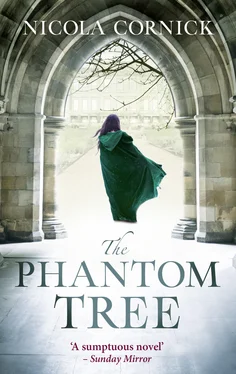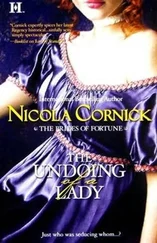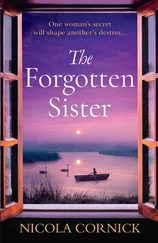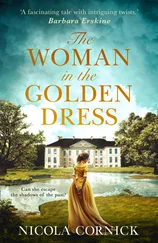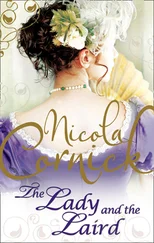‘A horse and a dead woman?’ She laughed. ‘Mayhap is was Queen Anne Boleyn you saw then. If it had not been for your Aunt Jane she would not have lost her head. Maybe she is coming for you in revenge.’
The sound of voices and the lifting of the latch warned her. She scrambled away and when Liz and Dame Margery re-entered the room she was sitting on the window seat all prim and quiet.
‘She sleeps,’ she said sweetly. ‘May I go now?’ And with that she slipped from the room leaving me with my feverish nightmares.
*
Darrell came to me that night as I was tossing and turning in my sleep. Darrell had been my companion, from the earliest time. He was more than a daydream or an imaginary friend. I knew from the start that he was as real as I; that we could talk to each other in images and thoughts and ideas. Such things are natural to children. We do not question. I did not know who he was. I assumed we must be related in some way, such gifts so often connecting members of one family, but I had so many relatives and when I looked around at the sprawling network of my Seymour cousins not one of them felt right. He told me his name was Darrell and even though he knew I was called Mary he called me Cat because he said I was small and fierce. I loved him; it was simple and comfortable because I had always known him. He felt almost like another aspect of myself, closer than close
‘ Cat. Are you there? ’
The words came to me, as they had always done, as a whisper sliding into my mind, calling me. From earliest childhood it had happened like this, first in blocks of colours and images in my mind and then, as I grew older, in words and emotions.
‘ Where are you? ’
I ignored him, turning a shoulder as though he was in the room and I was shunning him. When I had been obliged to leave Grimsthorpe, I had called to him for comfort but he had not replied. I had been hurt, needing him and the comfort his presence brought. Yet sometimes it had been like this. He slipped back and forth through my life and sometimes when I needed him, he was gone. This was the first time he had spoken to me since I had left Lincolnshire and it was contrary of me to sulk when he was the one person who could make me feel better.
‘ Cat? ’
‘ I am at Wolf Hall. ’ I was short with him.
I felt his puzzlement before it cleared like rain clouds running from the sun.
‘ Savernake? Why? ’
‘ They sent me away again. ’ I was sick and feeling sorry for myself. I felt him laugh. Unforgivable.
‘ Poor Cat. ’
I sent him the mental equivalent of a rude gesture I’d seen the servants make and felt him laughing harder.
‘ Such a lady. ’
‘ Go away. ’
He sobered at once, sensing the genuine misery beneath my ill temper.
‘ I’m sorry. Is it very bad? ’
This time I sent a shrug, a hardy sort of a feeling. It was bravado. He knew I was homesick and lonely and unhappy. He could sense it. I could not keep him out even when I wanted to do so. Yet I also knew that not so many years before he too had been sent from home. I had sensed his loneliness and isolation. I had tried to get him to tell me about it—had he gone to another household for his education? It was the way life ran for the sons of noble households and sometimes the daughters too. He would tell me nothing about himself, though, not then, not ever. He was a mystery to me.
‘ There’s the forest to explore. You love the forest. ’
The thought felt eager and so like a boy, trying to offer solutions. If only he knew how much the forest had cost me already. Nevertheless, I had softened towards him. I could not help myself. He always made me feel better. There was comfort in his presence and I no longer felt so alone.
‘ Yes. I suppose so. ’
He sent me a boy’s hug, clumsy, affectionate. I smiled. The warmth of it soothed me, lulling me back into sleep.
‘ Goodnight, Darrell. ’
‘ Goodnight, Cat. ’ Goodnight, goodnight…
I slept.

As soon as my fever had gone, Alison came back like nettle rash, irritating, never leaving me in peace. Of course I would not be ten years old for ever and Alison and I would not always be at daggers drawn, but just then it felt as though we would. For a little while we rattled around together like two cats trapped in a box, hissing, scratching each other, fighting on occasion, but over time we learned to live with each other. We kept a wary distance although life at Wolf Hall did not make it easy to avoid her.
We were up at five, whether it was summer or winter. In the summer this was no hardship for dawn had crept into the room long before, but in winter I clung to the warmth of my bed for as long as I could. Naturally, Alison called me lazy. In order to eat we had to work, and the work started early. There was milk to be churned, pottage to be boiled, flax to be spun and carded, rushes to be peeled to make lights and rooms to be swept clean. I preferred working in the kitchen in the winter. At least there was a fire, whereas the damp chill of the forest crept like a ghost through the cracks and crannies of the old house. There was no idle chatter to accompany our work. This might be a nobleman’s household, but whilst my cousin Edward Seymour lived the life of a courtier in London, we followed the older rules of life in the country.
I was lucky. I had time given to learning: languages, reading and needlework. So did Alison. The idea, I imagine, was that we should be settled creditably in marriage when the time came. Alison had no interest in book learning and neither did I really, but there were two things that kept me at my studies. The first was the knowledge that my mother had been a well-educated woman and I felt in some obscure way that I would be letting her down if I were to abandon my lessons. The second was more practical. I knew that time spent in study was time not spent washing, cleaning and pickling fruit, which I liked even less than book learning.
Going to the market in Marlborough was our treat. It was not permitted often, which made it all the more exciting. We had no need for the eggs, butter and cheese on sale there since we made our own, but Dame Margery would purchase meat and fish to augment our stocks and we would browse the stalls selling leather purses and belts, nails, knives, dead pigeons and coneys.
The day would start with the long cart ride into town, jolting over the rutted forest tracks. Dickon escorted us. He had fought alongside the late Sir John Seymour, Edward’s grandfather, many years ago. On bad days, when his bones pained him, he would grumble that all he was fit for now was acting as nursemaid to a parcel of women. On good days, when the sun shone and the birds sang, he would whistle tunelessly as he rode beside us.
I loved the market for the noise and colour, the gossip and drinking, the smells and the sense of a bigger world beyond the brick walls of Wolf Hall. It mattered not to me that the cobbles of Marlborough ran with blood from the carcasses that hung on the pegs on the stalls, or that the sweet sickly smell of them mingled with the scent of ale and burning until Alison pressed her pomander to her nose and threatened to retch. When Dame Margery took her eyes off us I would slip away between the booths. The shouts and calls of the traders crashed like waves above my head as I wriggled between chickens in their cages.
‘Good day, Lady Mary.’ It was the barber surgeon, pausing in the removal of a tooth to greet me.
Читать дальше
